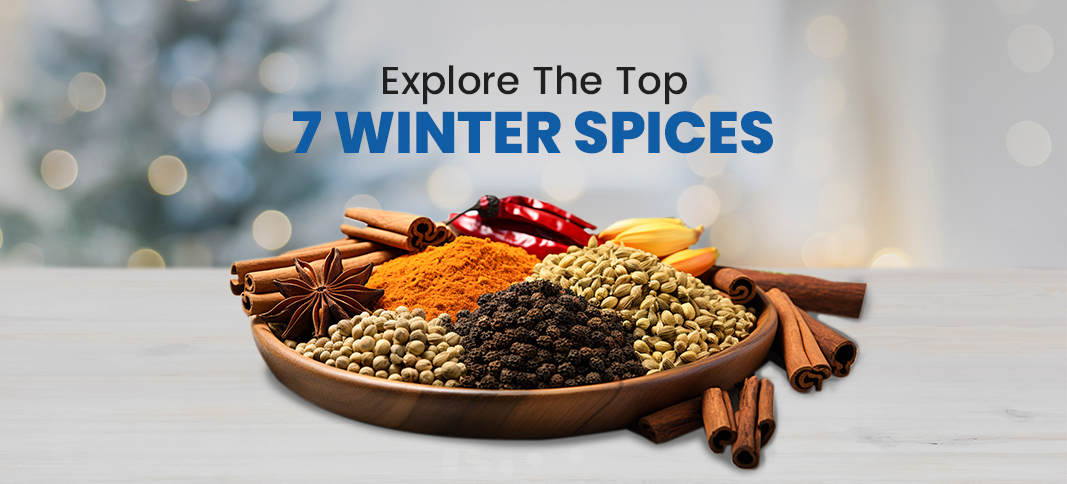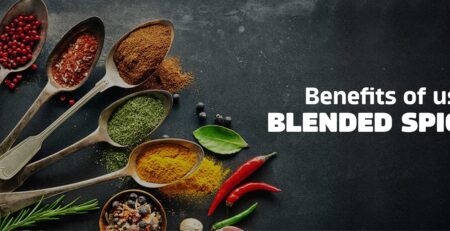The Top 7 Winter Spices That Will Enhance Your Recipes & Promote Health
As the winter season unfolds, infusing your recipes with a touch of warmth and health-boosting goodness becomes a delightful culinary journey. Discover the magic of winter spices that not only elevate the flavours of your dishes but also contribute to your overall well-being.
In this blog, we’ll explore the top 5 winter spices that add a seasonal charm to your kitchen creations while offering a plethora of health benefits. Spice up your winter cooking with these aromatic and nutritious additions!
What Are Winter Spices? <h2>
Winter spices are a delightful array of aromatic herbs and seasonings that come into prominence during the colder months, adding a burst of flavour and warmth to your culinary creations. These spices are known for their ability to transform ordinary dishes into comforting delights, making them especially popular during the winter season.
Here is the popular winter spices list:
- Cinnamon
- Cardamom
- Ginger
- Cloves
- Turmeric
- Black Pepper
- Nutmeg
Explore The Speciality And Benefits Of These 7 Winter Spices
As winter unfolds its chilly embrace, the culinary world comes alive with a palette of spices that not only infuse warmth and flavour into our dishes but also offer a myriad of health benefits. Let’s delve into the special characteristics and winter-specific advantages of seven aromatic winter spices:
1. Cinnamon
Cinnamon, with its warm and sweet flavour profile, is a quintessential winter spice. It’s often associated with holiday baking and adds a comforting touch to everything from desserts to hot beverages.
Beyond its aromatic allure, cinnamon is known for its potential health benefits. It may help regulate blood sugar levels, has anti-inflammatory properties, and is rich in antioxidants.
2. Cardamom
Cardamom, with its unique floral and citrusy notes, brings a distinctive character to both sweet and savoury dishes. This spice is a staple in many winter desserts and chai teas.
Cardamom is renowned for its digestive benefits, helping to soothe indigestion and bloating. It also contains antioxidants that contribute to overall health.
3. Ginger
Ginger‘s zesty and slightly spicy flavour is a winter favourite, often used in both sweet and savoury dishes. It adds a warming element to soups, stir-fries, and baked goods.
Ginger is celebrated for its potential anti-nausea and anti-inflammatory properties. It’s also a natural remedy for soothing sore throats and cold symptoms.
4. Cloves
Cloves have a strong, aromatic flavour that imparts richness to winter dishes, especially in spice blends and mulled beverages. They are a key player in many holiday recipes. Cloves are packed with antioxidants and have anti-inflammatory properties. They may contribute to oral health and provide a boost to the immune system.
5. Turmeric
While commonly associated with savoury dishes, turmeric‘s warm and earthy flavour can enhance the depth of flavour in various winter recipes. It’s a key ingredient in many curries and stews. Turmeric contains curcumin, known for its potent anti-inflammatory and antioxidant properties. It may contribute to joint health and overall well-being.
6. Black Pepper
Black pepper‘s pungent and spicy kick is a versatile addition to winter dishes. It adds depth to soups, stews, and roasted vegetables.
Aside from enhancing flavour, black pepper may aid digestion and increase the absorption of nutrients. It’s also rich in antioxidants.
7. Nutmeg
Nutmeg’s warm, nutty flavour is a classic in many winter desserts, beverages, and savoury dishes. A little goes a long way in imparting a cosy and festive touch.
Nutmeg is believed to have calming properties and may promote better sleep. It also contains essential oils that contribute to its unique flavour profile.
How To Use These Winter Spices?
Unlocking the full potential of winter spices involves mastering the art of incorporating them seamlessly into your culinary creations. Here’s a guide on how to make the most of the unique flavours
- Cinnamon: Sprinkle on oatmeal, add to baked goods, or stir into hot beverages for a cosy, sweet touch.
- Cardamom: Elevate your tea by adding a pinch of ground cardamom or include it in desserts for a subtle, exotic twist.
- Ginger:Grate fresh ginger into stir-fries, soups, or marinades to impart a zesty warmth to savoury dishes.
- Cloves:Create aromatic spice blends for both sweet and savoury dishes or stud fruits and hams for a festive touch.
- Turmeric:Enhance curries, stews, and rice dishes with a pinch of turmeric for both flavour and vibrant colour.
- Black Pepper:Use freshly ground black pepper to season a variety of dishes, from salads to roasted vegetables, for a bold, spicy kick.
- Nutmeg:Grate nutmeg into baked goods, puddings, or creamy beverages for a subtle, nutty nuance.
Summing Up!
As the winter season unfolds its chilly embrace, incorporating the top seven winter spices into your recipes not only elevates the flavours of your dishes but also brings a host of health benefits to the table. From the sweet warmth of cinnamon to the exotic notes of cardamom and the zesty kick of ginger, each spice plays a unique role in turning your winter meals into comforting delights.
Frequently Asked Questions On Winter Spices
1. What Spices Are Good In Winter?
Ans: Cinnamon, cardamom, ginger, cloves, turmeric, black pepper, and nutmeg are excellent spices for winter, adding warmth and flavour to a variety of dishes.
2. What Spices Keep Body Warm?
Ans: Ginger and black pepper are known for their warming properties and are often used in winter recipes to help keep the body warm.











